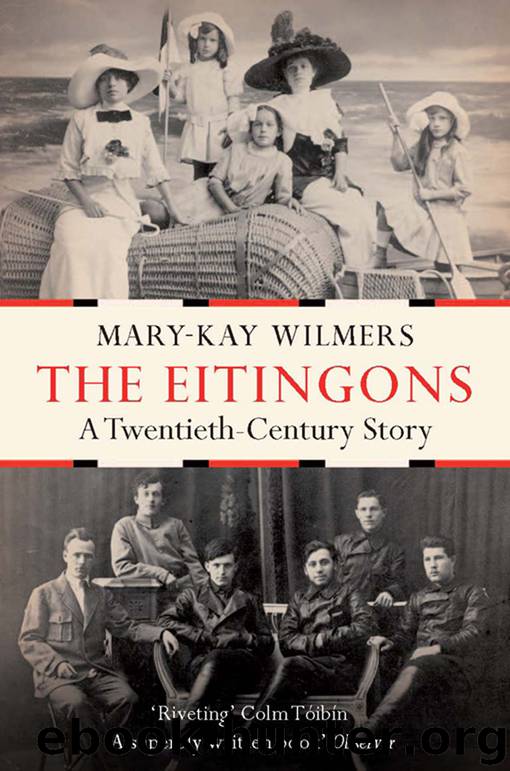The Eitingons by Mary-Kay Wilmers

Author:Mary-Kay Wilmers
Language: eng
Format: epub
Publisher: Verso Books
Published: 2012-03-26T04:00:00+00:00
CHAPTER 23
Spain
These are some of the things that you can buy in the main food market in Valencia: sheep’s heads with eyes, hens’ eggs straight from the hen’s belly, pigs’ and calves’ trotters fresh from the butcher’s saw, condensed blood, coxcombs, tripe and meninges. You can, I imagine, find much the same things in any number of other towns in Europe and elsewhere, but Valencia is the only place that I have seen them. Leonid lived in the Hotel Inglés in Valencia during much of the Spanish Civil War and sometimes when I think of him there, I think of the food market and its distressing wares.
He was generally known as General Kotov, Leonid Alexandrovich Kotov, and his codename was Pierre. To some he posed as a military attaché, but officially he was the deputy chief of the NKVD in Spain and at the end the chief. ‘The Spanish Republic’, Eric Hobsbawm said sixty years later, ‘remains the only political cause which, even in retrospect, appears as pure and compelling as it did in 1936.’ Part of the reason, it seems fair to say, is that ‘our side’ lost. And Leonid was one of those who would eventually help it to lose.
Leonid’s boss, Alexander Orlov – codename Shved, Party name Nikolsky, real name Feldbin – arrived in Spain in early September 1936, some six weeks after the war began. Leonid’s stepdaughter, Zoya, dismisses Orlov as ‘an ordinary military man’ but he wasn’t very ordinary, as we shall see. Leonid presumably got there around the same time.
Leonid, now thirty-seven, was accompanied by a different ‘wife’: Alexandra Kochergina (Shura), an officer in the GPU – ‘an attractive brunette’, as General Sudoplatov amiably remembers her. She worked in the visa section; and since everyone who came to Spain to join the International Brigades had to surrender their passport, I take it to mean that Kochergina was part of the team that recycled passports for future NKVD use: Ramón Mercader probably used one to travel to Mexico. Orlov’s wife, too, had come to Spain and was living outside Valencia with their daughter. In July 1938 the Orlov family relocated to North America – I haven’t used the word ‘defected’ because the issue is still vexed. That was when Leonid took charge.
Stalin had been slow to announce his intention to intervene on behalf of the Spanish Republic, but when he did it was in stirring terms. ‘Liberation of Spain from the yoke of the fascist reactionaries is not the private concern of Spaniards alone, but the common cause of all progressive humanity,’ he said in an open letter to Spanish Communists. No one today would be taken in by such high-sounding sentiments, but if Stalin had some sense of what he was expected to do and to say it was in part at least thanks to Trotsky, who within days of the war’s beginning was denouncing him as the ‘liquidator and traitor of the Spanish revolution’ for his failure to take a stand.
Saving the Republic was never Stalin’s paramount aim.
Download
This site does not store any files on its server. We only index and link to content provided by other sites. Please contact the content providers to delete copyright contents if any and email us, we'll remove relevant links or contents immediately.
| Africa | Americas |
| Arctic & Antarctica | Asia |
| Australia & Oceania | Europe |
| Middle East | Russia |
| United States | World |
| Ancient Civilizations | Military |
| Historical Study & Educational Resources |
Red Famine: Stalin's War on Ukraine by Anne Applebaum(2912)
Midnight in Chernobyl by Adam Higginbotham(2530)
Chernobyl by Serhii Plokhy(2524)
Midnight in Chernobyl: The Untold Story of the World's Greatest Nuclear Disaster by Adam Higginbotham(2212)
The House of Government by Slezkine Yuri(2188)
Red Shambhala by Andrei Znamenski(2177)
The Gulag Archipelago (Vintage Classics) by Aleksandr Solzhenitsyn(2075)
Red Notice by Bill Browder(2063)
All the Kremlin's Men by Mikhail Zygar(2058)
From Cold War to Hot Peace by Michael McFaul(2022)
Putin's Labyrinth(2011)
From Russia with Lunch by David Smiedt(1958)
The Future Is History by Masha Gessen(1892)
A People's Tragedy by Orlando Figes(1859)
The Romanovs by Simon Sebag Montefiore(1812)
How to Tame a Fox (and Build a Dog): Visionary Scientists and a Siberian Tale of Jump-Started Evolution by Lee Alan Dugatkin & Lyudmila Trut(1758)
The Lost Spy by Andrew Meier(1740)
Putin's Labyrinth: Spies, Murder, and the Dark Heart of the New Russia(1737)
Art and Revolution by John Berger(1711)
